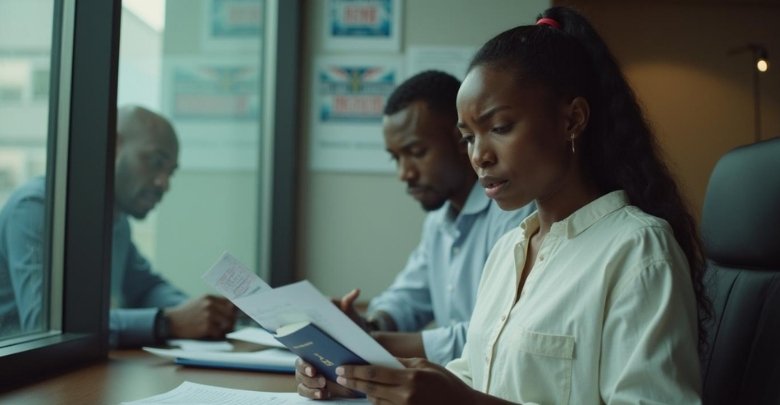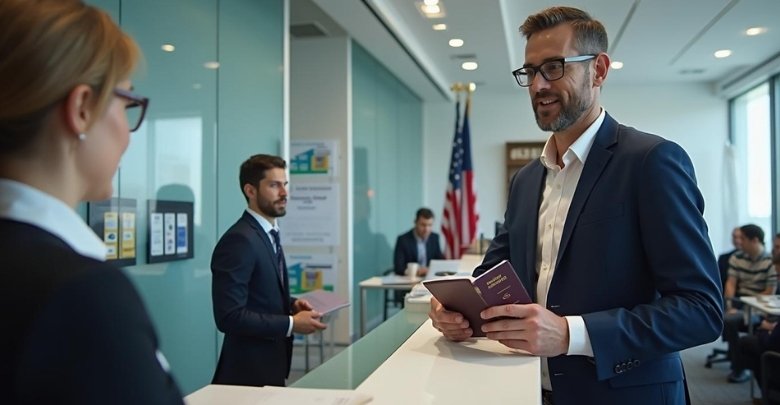Getting a U.S. visa can open up many opportunities, but facing a rejection can be a tough blow. Whether you’re hoping to travel, study, or work in the U.S., understanding the reason for a visa denial is essential to improving your chances next time. If you’re wondering How to Check USA Visa Rejection Reasons from Nigeria?, you’re not alone. Many applicants struggle to figure out where to start and what steps to take.
The first step is to carefully review the refusal letter you received, as it often provides the primary reason for the rejection. You can also check your visa status online through the CEAC portal or contact the embassy for more details. These resources can guide you in addressing the reason for rejection.
Want to know how to use this information to increase your chances? Keep reading to find out more!
How Do You Check the Reasons for the USA Visa Rejection From Nigeria?
Many Nigerians face USA visa rejections for various reasons, from incomplete documentation to failure to meet eligibility requirements. If your visa was denied, it’s important to check the reason to know what went wrong. This will help you prepare a stronger application next time. Let’s go through the steps to check your USA visa rejection reasons from Nigeria and how to move forward effectively.

Review the Embassy’s 221(g) or Refusal Letter
After a visa rejection, applicants receive a refusal letter, which is often under Section 221(g) or 214(b) of the Immigration and Nationality Act. This letter highlights why your visa was denied and whether further action is needed. Carefully reading and understanding this letter is the first step in identifying the issue.
Each refusal code represents a specific reason, such as insufficient financial proof, weak ties to Nigeria, or failure to meet visa requirements. Some rejections are temporary and require additional documents, while others may need a fresh application. Knowing the exact reason helps you plan your next move wisely.
Check out the DOE’s CEAC website
The Consular Electronic Application Center (CEAC) website allows applicants to check their visa status and potential rejection reasons. By entering your DS-160 confirmation number and interview details, you can view your status and any additional instructions provided by the U.S. embassy.
If your status shows Refused, it may include an explanation or a request for further documentation. In some cases, administrative processing may delay the final decision. Checking the CEAC portal ensures you stay updated on your application status and any required follow-ups.
Contact the U.S. Embassy in Nigeria
If the refusal letter does not provide enough details, reaching out to the U.S. Embassy can help clarify the rejection reason. You can contact them via email or visit the U.S. Mission Nigeria website for official communication channels.
Although embassies do not entertain direct appeals, they can offer guidance on whether you can reapply or submit additional documents. Understanding their response can help you make an informed decision about your next visa application attempt. Always ensure your inquiry is polite and specific to receive a helpful response.
Review Your DS-160 Form
Errors in your DS-160 application form can lead to visa rejection, even if other aspects of your application are strong. A simple mistake in personal details, work history, or financial information can raise red flags for visa officers.
Many applicants seeking visas for business trips or attending international conferences in USA may face denials due to inconsistent travel details or unclear sponsorship information. Go through your previously submitted form and compare it with your actual supporting documents. If discrepancies exist, correcting them in a new application can significantly improve your chances of approval. Ensuring accuracy in every section prevents unnecessary denials due to minor errors.
Understand USA Visa Rejection Reasons
Knowing the typical causes of visa denials can help applicants avoid repeated mistakes. Some of the most common reasons include a lack of strong ties to Nigeria, insufficient financial proof, incorrect documentation, or previous visa violations.
Knowing these rejection possibilities will help you prepare a better case for future applications. Strengthening weak areas, such as providing stronger financial statements or clearer travel intentions, can make a significant difference. A well-prepared application reduces the likelihood of another rejection.
What Happens When Your USA Visa Gets Rejected?
A visa rejection can be frustrating, especially if you were looking forward to traveling to the U.S. Whether for work, study, or tourism, a denial can feel like a major setback. However, understanding what happens after rejection can help you take the right steps to improve your chances in the future.
You receive a Refusal Letter
When a visa is denied, the consular officer provides a refusal letter explaining the reason for rejection. This letter usually cites sections of U.S. immigration law, such as 221(g) for missing documents or 214(b) for weak home-country ties. Carefully reviewing this document is essential in understanding what went wrong.
Sometimes, the refusal letter indicates administrative processing, meaning additional checks are required before a final decision. If this happens, the visa is not entirely denied, but further action may be needed. Understanding this distinction helps applicants avoid unnecessary panic and take the correct next steps.
Updated Visa Status on CEAC
After the visa interview, applicants can check their visa status on the Consular Electronic Application Center (CEAC) website. If the visa was denied, the status will be marked as Refused, but sometimes, it may show Administrative Processing, indicating further review is ongoing.
Checking this status helps applicants determine if additional action is required. In some cases, applicants experience stuck USA visa status and solutions for such conditions involve contacting the embassy, submitting additional documents, or waiting for further processing. Keeping track of the CEAC portal ensures you stay informed about your case and any possible follow-ups.
Reapply After Addressing Rejection Reasons
A visa rejection is not a lifetime ban, and most applicants can reapply. However, submitting a new application without addressing the reason for the previous refusal will likely result in another denial. If the rejection was due to financial proof, weak home ties, or missing documents, these issues must be resolved before reapplying.
A fresh application requires completing a new DS-160 form, paying the visa fee again, and scheduling a new interview. There is no waiting period, but it is best to apply only when significant improvements have been made. Taking time to fix weak points increases your chances of success.
A visa rejection is not the end of your U.S. travel plans. Learning from the experience, correcting mistakes, and reapplying with a stronger case can help you achieve a successful outcome in the future.
Why Do Nigerian Applicants Face USA Visa Rejections?
Every year, thousands of Nigerians apply for U.S. visas, but many face rejection. While a denial can be frustrating, understanding the reasons behind it can help applicants prepare better. Avoiding common mistakes and presenting a strong application increases the chances of success.
Weak Home Ties
Visa officers need to be convinced that an applicant will return to Nigeria after their visit. If someone fails to prove strong connections like a stable job, business, or family responsibilities, their application may be denied under Section 214(b). Documents like employment letters, property ownership proof, and bank statements help establish these ties.
Consistency in responses during the visa interview is equally important. If an applicant cannot confidently explain their reasons for returning, the officer may doubt their intentions. Strengthening proof of home ties significantly improves approval chances.
Insufficient Financial Proof
Applicants must show they can afford their trip without financial struggles. If bank statements, salary slips, or sponsorship details appear inconsistent or weak, visa officers may suspect financial incapability. A sudden large deposit before the interview can also raise red flags.
Providing verifiable financial records with steady transaction history reassures officers of financial stability. An applicant’s ability to pay for their stay is one of the factors consular officers consider when reviewing a visa application. A well-documented financial plan improves the chances of approval.
Unclear Travel Intentions
A poorly explained reason for traveling raises suspicion. If an applicant cannot clearly state why they want to visit the U.S. or fails to provide supporting documents, visa officers may doubt the trip’s purpose. This is especially true for applicants without a strong travel history.
Documents like a clear itinerary, invitation letters, or hotel reservations help support an application. Interview responses should match the details in the DS-160 form. Providing straightforward and consistent information avoids unnecessary complications.
Past Visa Rejections or Overstays
A history of visa denials or overstaying a previous U.S. visa affects future applications. Consular officers review past records, and repeated rejections can raise credibility concerns. Consequently, US visa rejection possibilities increase if past issues remain unaddressed, making it harder for applicants to gain approval.
Applicants should analyze the reason for the previous refusal and work on correcting it. Providing stronger documentation and clear explanations can improve the chances of getting approved. Taking time to fix past visa-related issues increases future success rates.
Understanding why visa applications get rejected helps Nigerian applicants improve their chances in the future. Strengthening financial proof, demonstrating clear travel intentions, and ensuring complete documentation significantly enhance the likelihood of securing a U.S. visa.
How to Improve Your Next USA Visa Application for Better Results?
Applying for a USA visa can feel overwhelming, but it’s crucial to understand that improving your chances starts long before the interview. Whether you’ve faced rejection or simply want to ensure a smoother process, careful preparation can make all the difference. Here are some effective strategies to boost the chances of a successful application.
Keep Your Documentation Up-To-Date
One of the most important aspects of any visa application is the completeness of your documents. Make sure you submit all required paperwork, including your DS-160 form, passport, photos, and supporting documents. Missing or incomplete information can cause unnecessary delays or lead to denial, so double-check everything before submitting.
Be Honest and Consistent in Your Application
Honesty is essential when filling out your visa application. Providing incorrect or inconsistent information, whether intentional or not, can raise red flags for consular officers. Stick to the facts in your answers and ensure that the details you provide match your supporting documents, such as financial statements and travel history.
Provide Strong Financial Proof
For most visa types, applicants must prove that they have sufficient funds to support their stay in the USA. This could include bank statements, employment letters, or sponsorship letters. Ensure that the financial proof you provide is clear, detailed, and up to date, as this can significantly impact your visa’s approval chances.
Show Clear Ties to Your Home Country
One of the main reasons for visa rejection is the lack of proof that you’ll return to your home country after your visit. Demonstrating strong ties, such as family, property ownership, or stable employment, reassures consular officers that you do not intend to overstay your visa. Make sure to highlight these ties in your application.
Prepare for the Interview
The visa interview is your opportunity to showcase your intentions clearly and confidently. Practice answering potential questions about your trip, your background, and your financial situation. Be polite, and concise, and stay calm throughout the process; the way you present yourself can make a significant difference in the outcome.
Improving your USA visa application takes time and effort, but following these strategies can enhance your chances of success. Stay organized, honest, and well-prepared, and don’t forget to show your genuine intent for travel. With careful planning and attention to detail, your next application could be much smoother.
Frequently Asked Questions
When applying for a U.S. visa, many Nigerian applicants find themselves wondering about the process after a rejection. To clarify common concerns, here are some frequently asked questions to guide you through understanding and addressing visa rejections.
Can I Appeal A U.S. Visa Rejection From Nigeria?
No, U.S. visa rejections cannot be appealed directly. The consular officers’ decision is final, and there is no formal process to challenge their decision. However, if you believe there was a mistake, you can address the rejection reason and submit a new application with stronger supporting documents. This is the best way to move forward after a denial.
How Long Do I Have to Wait Before Reapplying for a U.S. Visa After a Rejection?
There is no mandatory waiting period to reapply after a U.S. visa rejection. You can reapply immediately; however, it’s crucial to resolve the issues that led to the rejection before doing so. Simply reapplying without addressing the reasons for the previous denial will likely result in another rejection.
Can I Check My U.S. Visa Rejection Reasons Online?
Yes, you can check your visa rejection status online through the Consular Electronic Application Center (CEAC) website. While the website provides updates on the status of your visa application, it might not always provide detailed rejection reasons. In many cases, you’ll receive a refusal letter after the interview with specific details.
Do U.S. Embassies Provide a Detailed Explanation for Visa Rejection?
U.S. embassies generally provide a brief explanation in the refusal letter, but it may not always be detailed. The letter often cites the specific section of the U.S. immigration law under which your visa was denied. However, if you need further clarification, contacting the embassy or reviewing your application may help identify any missing details.
What Happens If My U.S. Visa Is Rejected for Administrative Processing?
If your U.S. visa is rejected for administrative processing, it means your case is still under review. This delay could involve additional background checks or document verification. It’s not a denial, and the embassy will notify you once a decision is made, but the wait time can vary.
Closing Statement
Knowing How to Check USA Visa Rejection Reasons from Nigeria? is a crucial step in turning a visa denial into a chance for improvement. While it can be disheartening to face rejection, knowing why it happened empowers you to take control of the situation and reapply with a stronger case.
By carefully reviewing the refusal letter, checking your status online, and addressing the areas of concern, you can increase your chances of success on your next attempt. Remember, a rejection isn’t the end; it’s a learning opportunity.
Now that you have a clearer understanding of how to check the reasons behind your visa rejection, you can take the next steps with confidence. Best of luck with your future applications.







